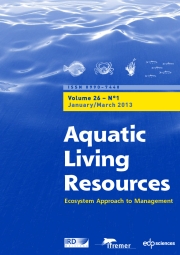Crossref Citations
This article has been cited by the following publications. This list is generated based on data provided by
Crossref.
Gélineau, A.
and
Boujard, T.
2001.
Oral administration of cholecystokinin receptor antagonists increase feed intake in rainbow trout.
Journal of Fish Biology,
Vol. 58,
Issue. 3,
p.
716.
Carter, C.G.
and
Houlihan, D.F.
2001.
Nitrogen Excretion.
Vol. 20,
Issue. ,
p.
31.
Carter, C.G
Lewis, T.E
and
Nichols, P.D
2003.
Comparison of cholestane and yttrium oxide as digestibility markers for lipid components in Atlantic salmon (Salmo salar L.) diets.
Aquaculture,
Vol. 225,
Issue. 1-4,
p.
341.
Bolliet, V.
Jarry, M.
and
Boujard, T.
2004.
Rhythmic pattern of growth and nutrient retention in response to feeding time in the rainbow trout.
Journal of Fish Biology,
Vol. 64,
Issue. 6,
p.
1616.
Krogdahl, Åshild
Sundby, Anne
and
Olli, Jan J.
2004.
Atlantic salmon (Salmo salar) and rainbow trout (Oncorhynchus mykiss) digest and metabolize nutrients differently. Effects of water salinity and dietary starch level.
Aquaculture,
Vol. 229,
Issue. 1-4,
p.
335.
MURASHITA, Koji
KUBOTA, Satoshi
KOFUJI, Patricia Yumi Morimoto
HOSOKAWA, Hidetsuyo
and
MASUMOTO, Toshiro
2005.
Trypsin restoration time in the pyloric ceca of yellowtail Seriola quinqueradiata.
Fisheries Science,
Vol. 71,
Issue. 6,
p.
1274.
Raven, Peter A.
Devlin, Robert H.
and
Higgs, David A.
2006.
Influence of dietary digestible energy content on growth, protein and energy utilization and body composition of growth hormone transgenic and non-transgenic coho salmon (Oncorhynchus kisutch).
Aquaculture,
Vol. 254,
Issue. 1-4,
p.
730.
YAMAMOTO, Takeshi
SHIMA, Takao
FURUITA, Hirofumi
SUGITA, Tsuyoshi
and
SUZUKI, Nobuhiro
2007.
Effects of feeding time, water temperature, feeding frequency and dietary composition on apparent nutrient digestibility in rainbow trout Oncorhynchus mykiss and common carp Cyprinus carpio.
Fisheries Science,
Vol. 73,
Issue. 1,
p.
161.
Fraser, Keiron P.P.
and
Rogers, Alex D.
2007.
Vol. 52,
Issue. ,
p.
267.
Kabir Chow, M.A.
Goda, Ashraf M.A.S.
El-Haroun, Ehab R.
Wafa, Mohamed A.
and
Salah El-D, Shady A.
2007.
Effect of Dietary Protein and Feeding Time on Growth Performance and Feed Utilization of Post Larval Freshwater Prawn Macrobrachium rosenbergii (de Man 1879).
Journal of Fisheries and Aquatic Science,
Vol. 3,
Issue. 1,
p.
1.
Kaushik, S.J.
and
Hemre, G.-I.
2008.
Improving Farmed Fish Quality and Safety.
p.
300.
Martins, Dulce Alves
Valente, Luisa M.P.
and
Lall, Santosh P.
2009.
Apparent digestibility of lipid and fatty acids in fish oil, poultry fat and vegetable oil diets by Atlantic halibut, Hippoglossus hippoglossus L..
Aquaculture,
Vol. 294,
Issue. 1-2,
p.
132.
Mennigen, Jan A.
Skiba-Cassy, Sandrine
and
Panserat, Stéphane
2013.
Ontogenesis of expression of metabolic genes and microRNAs in rainbow trout alevins during the transition from the endogenous to the exogenous feeding period.
Journal of Experimental Biology,
Marinho, Gonçalo
Peres, Helena
and
Carvalho, António Paulo
2014.
Effect of feeding time on dietary protein utilization and growth of juvenile Senegalese sole (Solea senegalensis).
Aquaculture Research,
Vol. 45,
Issue. 5,
p.
828.
Geurden, I.
Mennigen, J.
Plagnes-Juan, E.
Veron, V.
Cerezo, T.
Mazurais, D.
Zambonino-Infante, J.
Gatesoupe, J.
Skiba-Cassy, S.
and
Panserat, S.
2014.
High or low dietary carbohydrate:protein ratios during first-feeding affect glucose metabolism and intestinal microbiota in juvenile rainbow trout.
Journal of Experimental Biology,
Vol. 217,
Issue. 19,
p.
3396.
Paredes, Juan Fernando
Vera, Luisa María
Martinez-Lopez, F. Javier
Navarro, Isabel
and
Sánchez Vázquez, F. Javier
2014.
Circadian rhythms of gene expression of lipid metabolism in Gilthead Sea bream liver: Synchronisation to light and feeding time.
Chronobiology International,
Vol. 31,
Issue. 5,
p.
613.
Paredes, J. F.
López-Olmeda, J. F.
Martínez, F. J.
and
Sánchez-Vázquez, F. J.
2015.
Daily rhythms of lipid metabolic gene expression in zebra fish liver: Response to light/dark and feeding cycles.
Chronobiology International,
Vol. 32,
Issue. 10,
p.
1438.
Marandel, Lucie
Véron, Vincent
Surget, Anne
Plagnes-Juan, Élisabeth
and
Panserat, Stéphane
2016.
Glucose metabolism ontogenesis in rainbow trout (Oncorhynchus mykiss) in the light of the recently sequenced genome: new tools for intermediary metabolism programming.
Journal of Experimental Biology,
Yebra, L.
Kobari, T.
Sastri, A.R.
Gusmão, F.
and
Hernández-León, S.
2017.
Vol. 76,
Issue. ,
p.
157.
Panserat, Stephane
Plagnes-Juan, Elisabeth
Gazzola, Elsa
Palma, Mariana
Magnoni, Leonardo J.
Marandel, Lucie
and
Viegas, Ivan
2020.
Hepatic Glycerol Metabolism-Related Genes in Carnivorous Rainbow Trout (Oncorhynchus mykiss): Insights Into Molecular Characteristics, Ontogenesis, and Nutritional Regulation.
Frontiers in Physiology,
Vol. 11,
Issue. ,


